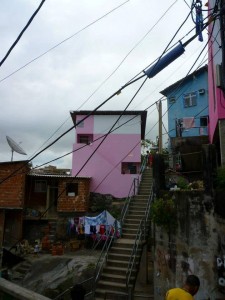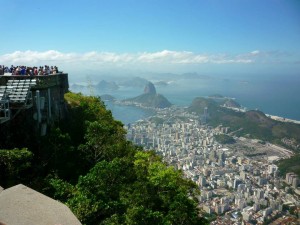
October 18, 2013, by Matt
Summer Geoging … Rio de Janeiro State University
Dr Stephen Legg writes about an ongoing collaboration with Dr André Reyes Novaes at Rio de Janeiro State University…
Following a three month visit to the School last year, I was invited to spend August with Dr André Reyes Novaes at Rio de Janeiro State University. André had come to Nottingham to develop his work on journalistic cartography, “slum”/“favela” developments in the 20th century, and theoretically informed methodologies in historical geography. During my time there I gave lectures at four universities (three campuses in Rio and one in Saõ Paulo) and conducted three graduate workshops.

A paint company has started sponsoring favela dwellers to paint their houses. Great PR for them but, it turns out, no money at all for the dwellers.
Myself and André are collaborating on a written piece resulting from our experiences in Nottingham and Rio, which will interrogate various geographies of translation (we’re got six so far!)
- Literal: all my presentations were translated, both slides and spoken word. The form and content of the latter depended upon whether the technology permitted simultaneous translation (headphones) or sequential translation (someone with me on stage translating sentence by sentence). Each form altered the flow and nature of what could be said, and also created different pauses and times for engagement and dialogue. Translations themselves also forced a (very welcome) interrogation of taken for granted vocabularies; what is the Portuguese for “hue and cry”? What does it mean to “upset the apple cart”?
- Geography and collaboration: what types of disciplinary conversation do we need to establish to create forms of connection which overcome the binaries of an old imperial core and (ex-)colonised (semi-)periphery?
- Case study comparisons: how do the cities we research (Delhi in India and Rio in Brazil) talk to each other in terms of their urban histories? Were slums/favelas dealt with in similar ways at similar times? If so, were there connecting figures or ideas?
- Disciplinary forms: how is geography practiced differently in the UK and Brazil? What are their strengths and weaknesses? Is there a Brazilian feminist geography? How do British geographers engage with social movements?
- An historical present: to what extent do historical case studies illuminate the present? How do the geographies of these trajectories affect our critical concepts today? How do criticisms of “liberalism” get read differently in countries that have experiences in living memory of military dictatorships or authoritarian rule?
- Travelling/translating theory: we both have an interest in continental philosophical theory, but how does it travel to South America/Asia? What do white men’s writings from the 1960-70s have to say about contemporary (or historical) Delhi or Rio?
Answers (on postcards) much appreciated!
Steve
No comments yet, fill out a comment to be the first


Leave a Reply